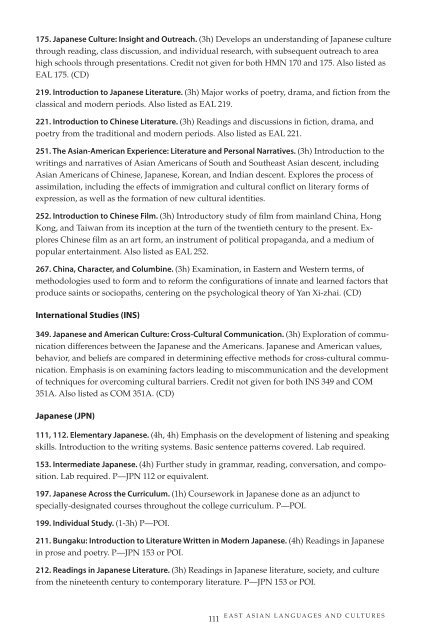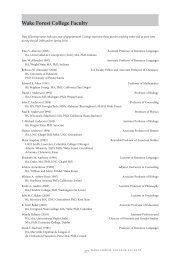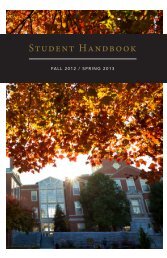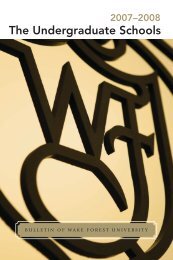theundergraduateschoo ls - Wake Forest University
theundergraduateschoo ls - Wake Forest University
theundergraduateschoo ls - Wake Forest University
You also want an ePaper? Increase the reach of your titles
YUMPU automatically turns print PDFs into web optimized ePapers that Google loves.
175. Japanese Culture: Insight and Outreach. (3h) Develops an understanding of Japanese culture<br />
through reading, class discussion, and individual research, with subsequent outreach to area<br />
high schoo<strong>ls</strong> through presentations. Credit not given for both HMN 170 and 175. A<strong>ls</strong>o listed as<br />
EAL 175. (CD)<br />
219. Introduction to Japanese Literature. (3h) Major works of poetry, drama, and fiction from the<br />
classical and modern periods. A<strong>ls</strong>o listed as EAL 219.<br />
221. Introduction to Chinese Literature. (3h) Readings and discussions in fiction, drama, and<br />
poetry from the traditional and modern periods. A<strong>ls</strong>o listed as EAL 221.<br />
251. The Asian-American Experience: Literature and Personal Narratives. (3h) Introduction to the<br />
writings and narratives of Asian Americans of South and Southeast Asian descent, including<br />
Asian Americans of Chinese, Japanese, Korean, and Indian descent. Explores the process of<br />
assimilation, including the effects of immigration and cultural conflict on literary forms of<br />
expression, as well as the formation of new cultural identities.<br />
252. Introduction to Chinese Film. (3h) Introductory study of film from mainland China, Hong<br />
Kong, and Taiwan from its inception at the turn of the twentieth century to the present. Explores<br />
Chinese film as an art form, an instrument of political propaganda, and a medium of<br />
popular entertainment. A<strong>ls</strong>o listed as EAL 252.<br />
267. China, Character, and Columbine. (3h) Examination, in Eastern and Western terms, of<br />
methodologies used to form and to reform the configurations of innate and learned factors that<br />
produce saints or sociopaths, centering on the psychological theory of Yan Xi-zhai. (CD)<br />
International Studies (INS)<br />
349. Japanese and American Culture: Cross-Cultural Communication. (3h) Exploration of communication<br />
differences between the Japanese and the Americans. Japanese and American values,<br />
behavior, and beliefs are compared in determining effective methods for cross-cultural communication.<br />
Emphasis is on examining factors leading to miscommunication and the development<br />
of techniques for overcoming cultural barriers. Credit not given for both INS 349 and COM<br />
351A. A<strong>ls</strong>o listed as COM 351A. (CD)<br />
Japanese (JPN)<br />
111, 112. Elementary Japanese. (4h, 4h) Emphasis on the development of listening and speaking<br />
skil<strong>ls</strong>. Introduction to the writing systems. Basic sentence patterns covered. Lab required.<br />
153. Intermediate Japanese. (4h) Further study in grammar, reading, conversation, and composition.<br />
Lab required. P—JPN 112 or equivalent.<br />
197. Japanese Across the Curriculum. (1h) Coursework in Japanese done as an adjunct to<br />
specially-designated courses throughout the college curriculum. P—POI.<br />
199. Individual Study. (1-3h) P—POI.<br />
211. Bungaku: Introduction to Literature Written in Modern Japanese. (4h) Readings in Japanese<br />
in prose and poetry. P—JPN 153 or POI.<br />
212. Readings in Japanese Literature. (3h) Readings in Japanese literature, society, and culture<br />
from the nineteenth century to contemporary literature. P—JPN 153 or POI.<br />
E A S T A S I A N L A N G U A G E S A N D C U L T U R E S<br />
111






